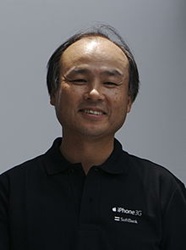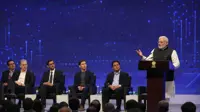 Chief executive Masayoshi Son
Chief executive Masayoshi SonSoftBank will “overachieve” on its commitment to invest $10 billion in 10 years in India “much ahead of time and at a much bigger scale” than it had anticipated, as the Japanese telecom and internet investor has already pumped in over $7.2 billion (Rs47,000 crore) in the country in past four years, according to chief executive Masayoshi Son.
In 2014, the founder-chairman of the global internet and telecoms giant had announced plans to invest $10-billion in ten years in the country.
SoftBank’s investments include its stake in India’s largest startup, Flipkart. Last year, Son also acquired the single biggest share in the world’s most valuable startup Uber. SoftBank has a substantial stake in home-grown ride-hailing rival Ola, too.
SoftBank plans to double down with a local investment team for its $100 billion Vision Fund, despite some of its bets like Snapdeal and Housing.com not having worked out.
“We were excited to invest in Snapdeal. It is unfortunate that it did not do well. But we made an investment in Flipkart after that. We are extremely happy with its progress,” Son said in media interactions on Sunday.
Son sees opportunities for Indian portfolio firms such as Oyo Rooms to go overseas and become global leaders while bringing its overseas portfolio companies here.
The opportunity in India is still massive, said the 60-year-old shortly before his meeting with Prime Minister Narendra Modi. He will also meet entrepreneurs on his three-day India trip.
“The first time I met him (PM Modi), I made a commitment that we will invest $10 billion in India. Some of our guys said don’t give too (high a) number which we may not able to achieve. But we have invested over $7 billion in four years,” Son said.
“We would definitely overachieve on our commitment much ahead of time and at a much bigger scale,” said Son.
SoftBank last year announced its $100 billion Vision Fund, as Son reshapes his telecoms group into a technology investing powerhouse. Led by India-born Rajeev Misra, the SoftBank Vision Fund (SVF), which is the largest pool of private capital globally, has been driving consolidation, ploughing billions into companies across robotics, e-commerce and on-demand transportation.
“Just one year ago, before we launched the Vision Fund, people said, ‘Masa, you are crazy’, the fund is too big to give good returns. But we are doing fantastically well,” said Son famous for backing Jack Ma’s Alibaba with $20 million back in 2000. On the back it, SoftBank registered a jaw dropping 44 per cent internal rate of return in the last 18 years - growing the value of its investments from $18 billion to $260 billion.
“There are some examples of young Indian entrepreneurs creating new original models ahead of the world, such as Oyo … there are many business models created in the US, China, and Japan, but not much in India in the past. But young entrepreneurs in India are creating very unique models that can scale worldwide, which is exciting,” said Son.
Oyo works with small- to mid-sized independent hotels to help standardise the experience for customers while they come under the fold of its brand, which started online. Founded by now 24-year-old Ritesh Agarwal when he was in his teens, Oyo operates these hotels under franchise or management arrangement. The company has already expanded to Southeast Asia and is set to enter China and Europe.
Son also cited the example of how Ola has localised ride-hailing for India with autorickshaws, and if the experiment with electric rickshaws succeeds, it can be deployed in other markets as an affordable offering, he said.
He declined to comment on a potential Uber-Ola consolidation and Flipkart’s talks with Walmart and Amazon.
“We have invested in 34 companies in the Vision Fund in the last one year since we started, and I think 10 of those companies will come to India,” said Rajeev Misra, chief executive of the SoftBank Vision Fund, who is also on the SoftBank board.
The companies may set up joint ventures in India and the list includes German online car dealer Auto1 and Katerra, a technology-driven offsite construction company.
Since it actively started investing in mid-2014, SoftBank has become the biggest backer of India’s digital entrepreneurs.
According to Son, ease of doing business in the country has improved since it started investing as “India is evolving very quickly”. But there are still challenges in the economy for his portfolio companies to achieve full scale.
“The network could be better, the logistics for ecommerce could be better, the average GDP per capita and consumption should grow for the bigger business opportunities which I think is coming very soon. Those are the issues but those are the opportunities,” he said.
Since announcing the $100-billion SoftBank Vision Fund, his firm has started writing much bigger cheques and betting on market leaders, pouring a collective $4 billion last year into online retailer Flipkart and payments major Paytm.
This year, SoftBank has invested $400 million in Paytm Mall and is in advanced talks to pick up a stake in Policybazaar.
One of the driving forces behind the Vision Fund has been ‘singularity’, a concept that describes a state of affairs where artificial intelligence (AI) outstrips humans and takes over a number of jobs. But according to Misra, fears that AI will lead to massive unemployment is just overseeing the benefits it may bring to an economy like India.
“I think it is wrong to say that there are going to be job losses because of AI. Demand exceeds supply. There is not enough skilled labour in the country,” he said, adding that AI could be used to train doctors and teachers. “Using AI, we can educate a primary healthcare worker, deliver telemedicine and diagnosis.”
 Chief executive Masayoshi Son
Chief executive Masayoshi Son



















